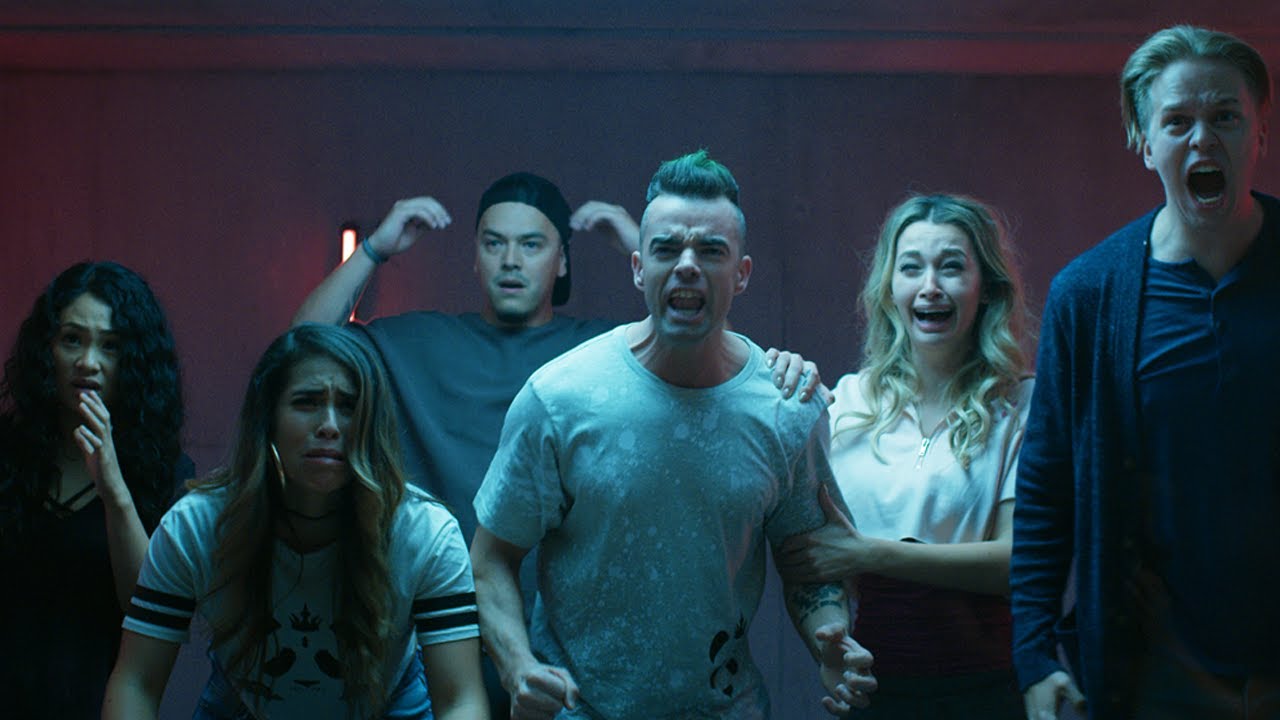What to Watch Verdict
'Funhouse' finds out what happens when C-list celebrities stop being polite, and start getting real...underwhelming given an outdated commentary and glancing blows.
Pros
- +
🐼 Jerome Velinsky shines as an evil panda
- +
🐼 Gets aggressive against online toxicity.
- +
🐼 Plays with stereotypes we've seen.
Cons
- -
🐼 Feels sharper a decade ago.
- -
🐼 The Big Brother spectacle runs a bit thin.
- -
🐼 CGI effects are a distraction.
With Funhouse, writer and director Jason William Lee jumps on the bandwagon of horror filmmakers who view reality television as its own nightmare classification. The shallowness of Bachelor and Bachelorette “romanticism” meets the candid egotism of Big Brother, with a “torture porn” twist. It’s not the freshest iteration of social media terror, given how the setup of audiences voting to “eliminate” players is something witnessed in countless comparison points—even something like The Condemned—which is a downfall of Funhouse since it’s not saying much we haven’t heard preached prior. This plainness in punishment ensures rougher elements like stock-footage inserts and some iffier performances stick out like a paid-off influencer on TikTok, and undercuts the “Fun” in this meant-for-dead “Funhouse.”
Welcome to Furcas’ “House Of Fun,” where eight C-List celebrities—gossip bloggers to background singers—compete for a chance to win $5 million on a 24-hour livestream. Kasper Nordin (Valter Skarsgård) had his heart broken on national television; James “Headstone” Malone fell out of MMA stardom when his life spiraled, so on and so forth. It’s all bitchiness and booze until the first night of eliminations comes, and Furcas’ (Jerome Velinsky) sense of “fun” turns out to carry deadly consequences for contestants. You lose? You become a human pinata or bathe in acid. “Are we having a good time,” asks the maniacal computer-generated panda bear hosting the festivities?
At its purest distillation, Funhouse aims at follower worshipping that has become aggressively toxic as a celebration of “mediocrity,” which the snarky and seething Furcas condemns. The “Kardashianization Of Humanity,” showrunner Nero—in Furcas mo-cap gear—pushes through gritted teeth like dialogue straight out of the early 2010s. It’s evident that Lee’s frustration with society is more about how we’ve made no progress since the great downfall once citizens began grading popularity on likes and hearts, but at times, struggles to be enough with such meager gameplay dynamics. There’s a hellish tease that something devilish and demonic may be at stake, but suspense reduces to FBI talking heads failing to trace Furcas’ IP address. A less than thrilling faux news program filler.
Inside the “Funhouse,” every user-generated stereotype is on display like zoo exhibits from Ximena Torres’ (Gigi Saul Guerrero) fiery celebrity rumor stirrer to European Instagram model Ula La More (Karolina Benefield) and her weaponization of nudity. There’s an attempt to equate these false cyber idols to wholesome lives worth living, with their imprisonment coming as some grand repentance—but it’s a purgatorial motif muddled by exaggerations that are reduced to Dex (Mathias Retamal) flashing shocker symbols or Ximena’s immediate hatred of Ula right out of Slut-Shaming 101 handbook written by Jersey Short templates. There’s a familiarity with the “monsters” on display. While some actors shine—Headstone is a charismatic boozer, most other performers find some semblance of humanity in their infamy—the overall weight of singular journeys is stunted by redundant commentary that dwells on forced Real World dramatics.
When horror viciousness takes over, Funhouse is a mixed bag. Heavy reliance on animated gore is an unfortunate presentation, whether that's a rack pulling limbs apart or someone’s torso separation via chemical solutions. Jerome Velinsky stands out as the program's animalistic master of ceremonies, annunciating each merciless syllable through monologues about harlequin romances dripping with cheese for votes or the outright demise of famous names holding any talent nowadays—Furcas’ angry face is a particular delight. It’s just a shame how the most repulsive and gruesome sights are a far cry from what more practical implications could have accomplished (minus one bleeding heart), which is a similar critique to the stock footage already mentioned. Maybe that’s a commentary on the “stock nature” of reality and what we perceive as normal? In any case, interludes are clips from an anonymous extra footage pile as segues from “Funhouse” to “outside,” except when Tosh.O wannabe Pete’s Sake attempts his best Joel McHale on The Soup impression (meh).
For every indictment of the depravity within attention-seeking, morality sucked aspects of online culture that Funhouse abrasively argues against, there are less-than-successful fallbacks that weaken Jason William Lee’s most barbed accusations. The intimate lawlessness of the “Funhouse” is at its best when actors acknowledge their characters’ misdeeds, and worst when violence becomes a punctuation point or lowest hanging digital fruits become the default. Kudos to Jerome Velinsky’s attempt at playing the literal devil, but cheapness in B-roll of hyperlapse clouds or random pedestrians viewing phones is a deficit. A thesis is articulated, but it’s one made day in and day out—Funhouse rarely adds to the conversation, and nor do its genre fittings inspire enough exceptionalism to execute a larger bite out of the hypnosis of glowing screens.
Funhouse releases on VOD May 28, 2021.
The latest updates, reviews and unmissable series to watch and more!
Matt Donato is a Rotten Tomatoes approved film critic who stays up too late typing words for What To Watch, IGN, Paste, Bloody Disgusting, Fangoria and countless other publications. He is a member of Critics Choice and co-hosts a weekly livestream with Perri Nemiroff called the Merri Hour. You probably shouldn't feed him after midnight, just to be safe.


